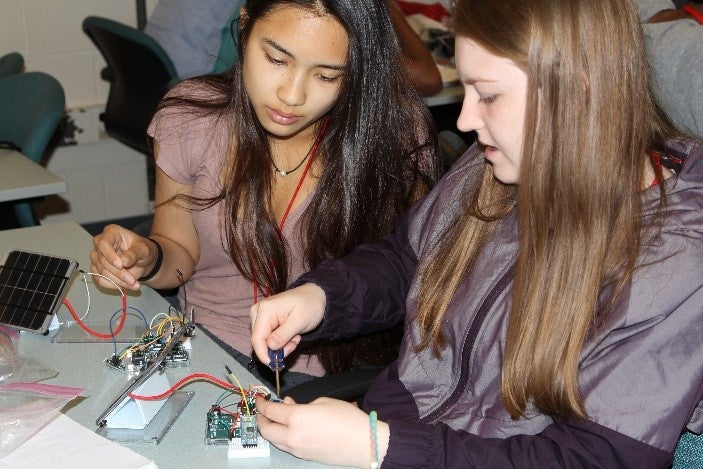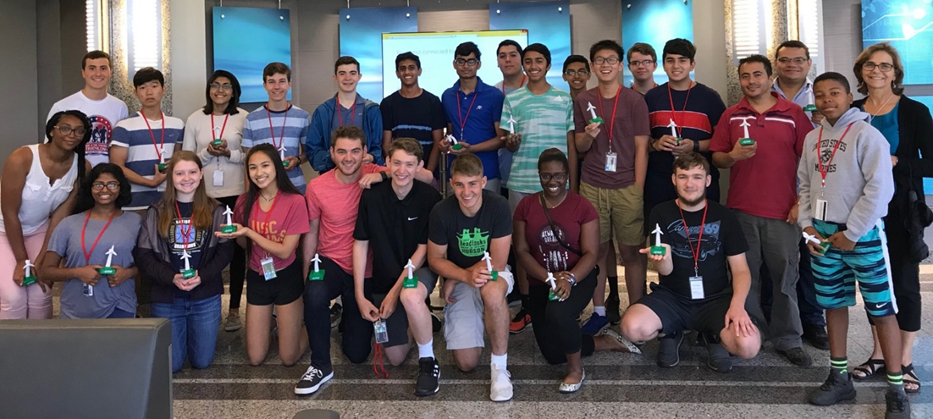
(TROY, NY) The CURENT Engineering Research Center at Rensselaer Polytechnic Institute hosted a one-week high school summer enrichment program during July. The program appropriately called “Smart Grid” included 20 high school students. While most students were from the northeast region of the United States, students also came from as far away as Pennsylvania, Virginia, North Carolina, San Diego, CA, and Puerto Rico.
The comprehensive program included talks by faculty and graduate students describing the engineering behind power generation to address today’s real world energy challenges. Throughout the week, the students also participated in faculty led tours of RPI’s state-of-the art research laboratories and worked on an electronic build of a CURENT Solar Panel table-top device. The hands-on build effectively taught them about intricate circuit layout, solar energy power, C++ coding and Bluetooth technology. All of the students were able to returned home with the device they built.
A highlight of the week was an educational field trip to the New York Independent System Operator (NYISO) Control Room, which manages a power grid including 11,000 circuit miles of transmission from 760 power generation units across New York state.

About Smart Grid Summer Enrichment at Rensselaer Polytechnic Institute
The Smart Grid Summer Enrichment program is sponsored by the National Science Foundation and the Department of Energy through the CURENT Engineering Research Center. The program, hosted at RPI in Troy, New York, provides high school students from around the world with a quality, hands-on experiential learning opportunity. Participants of the program learn how the electric grid is being adapted to incorporate renewable sources such as solar arrays and wind turbine, gain a comprehensive understanding of computer networks and cyber security, and use simulations tools to address current technological challenges of the grid with RPI’s faculty and graduate students. www.summer.rpi.edu/programs
About the Center for Ultra-Wide-Area Resilient Electric Energy Transmission Networks (CURENT)
The CURENT center is a National Science Foundation Engineering Research Center that is jointly supported by the NSF (National Science Foundation) and the DoE (Department of Energy). It is part of a joint collaboration of academia, industry, and national laboratories. CURENT is led by the University of Tennessee, Knoxville. And its partner institutions include: Northeastern University, Rensselaer Polytechnic Institute, and Tuskegee University. www.curent.utk.edu
About Rensselaer Polytechnic Institute
Rensselaer Polytechnic Institute, founded in 1824, is America’s first technological research university. For nearly 200 years, Rensselaer has been defining the scientific and technological advances of our world. Rensselaer faculty and alumni represent 85 members of the National Academy of Engineering, 17 members of the National Academy of Sciences, 25 members of the American Academy of Arts and Sciences, 8 members of the National Academy of Medicine, 8 members of the National Academy of Inventors, and 5 members of the National Inventors Hall of Fame, as well as 6 National Medal of Technology winners, 5 National Medal of Science winners, and a Nobel Prize winner in Physics. With 7,000 students and nearly 100,000 living alumni, Rensselaer is addressing the global challenges facing the 21st century—to change lives, to advance society, and to change the world. www.rpi.edu
Leah Scott, MBA
Marketing and Outreach Manager
School of Engineering
Rensselaer Polytechnic Institute
Office: (518) 276-4010
Email: scottl2@rpi.edu
Website: ecse.rpi.edu
Elizabeth Herkenham
K-13 Education Outreach Director
School of Engineering
Rensselaer Polytechnic Institute
Office: 518-276-6245
Email: herkee2@rpi.edu
Website: ecse.rpi.edu


